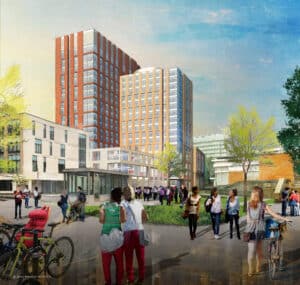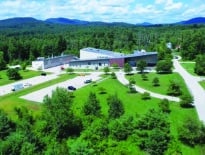
Simmons University’s consolidated campus includes a new residential tower containing athletic and dining facilities. Completion is targeted for December 2026. Image courtesy of Elkus Manfredi Architects
Boston has proven resilient despite all sorts of calamities in its 400-year history. Through climate disasters, oppositional governments, economic downturns, the Revolutionary and Civil Wars, conflicts on foreign soils, public health crises and pandemics – and various periods of social unrest – the city has endured.
Despite strong headwinds across New England in 2025, our forward-thinking institutions continue to innovate to solve the problems of today and meet the demands of tomorrow.
In Cambridge’s Kendall Square, the MIT Investment Management Company (MITIMCo), is moving forward with a new corporate headquarters for Biogen at 75 Broadway.
Across the Charles River in the Fenway, Simmons University is moving forward with a new Living and Learning Center, which will also be home to a gymnasium, a natatorium and a dining facility.
And in Medford, Tufts University has just broken ground on a project consisting of two new residence halls.
Each of these projects took a gritty mix of creativity, financial commitment, and compromise to come to fruition.
New HQ Tower as Anchor
The 75 Broadway building will be the new corporate headquarters for Biogen.
It’s one of Kendall Square’s most storied companies, founded in 1978 in Geneva by Harvard’s Walter Gilbert, MIT’s Phillip Sharp, and others.
The corporate headquarters building will anchor what will be known as Kendall Common. That’s the new name for the redevelopment of the Volpe National Transportation Systems Center site, a 10-acre tract that MIT executed an exchange agreement with the US government for in 2017.
MIT embarked on a highly participatory community planning study from 2017 to 2019, resulting in an approved plan for a dynamic mix of institutional research, residences, retail and community facilities.
After the master plan’s approval, MIT set out to plan and permit the individual buildings, culminating in 75 Broadway’s Planning Board approval in May 2023. Biogen and MIT signed a lease agreement in March 2025.
College Land, Commercial Development
In the Fenway, Simmons University has begun construction on a 1,000-bed mixed use tower that will also house dining, gym and natatorium facilities.
Planning began in 2017 when Simmons issued a developer request for proposals in conjunction with a master plan to consolidate two separate campuses – one academic, one residential – into a single integrated campus.
This strategy allows the residential campus to be commercially developed, with proceeds funding the university’s endowment for generations.
The ambitious plan required relocating several academic departments between 2020 and 2023, freeing up a valuable corner site for the new 18-story, 390,000 square foot Living & Learning Center. The project broke ground last year with completion targeted for December 2026.
And most recently, Tufts University has begun construction on a project featuring two 10-story residence halls with 664 apartment-style student beds. After preliminary studies, the project came together in 2024 through a public-private partnership with Capstone Development Partners, who worked with the university to build consensus with adjacent residents through neighborhood presentations, streetscape improvements, and landscaping upgrades.

John Martin
Bright Spots in a Tough Year
2025 is without doubt a difficult year for universities, lenders, real estate developers, construction managers and design professionals.
These three projects are bright spots offering valuable lessons. Each required years of planning and entitlement processes. Each demanded extensive negotiation with community stakeholders. Each relied on institutional-private partnerships and complex financial transactions.
All are entering construction during unprecedented uncertainty.
What distinguishes these projects is their owners’ long-term vision: confidence that we make our world better by pushing the limits of new scientific discovery, that we make our communities better by bringing students onto campus and more deeply engaging them in living and learning alongside those who come from different cultures and demographics, and that moving forward during difficult times will have its reward.
Fortune indeed favors the bold.
John H. Martin is a principal at Elkus Manfredi Architects.






